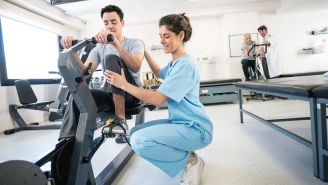Cardiovascular disease is the number one cause of death in the United States, and a large percentage of those deaths are due to preventable factors. Whether you've landed in the hospital following a heart attack or deal with a heart problem at home every day, cardiac rehabilitation—often called cardiac rehab—can improve your heart health, boost your quality of life and may even give you a few extra years.
Cardiac rehab is a customized, medically supervised plan designed to help you recover from or cope with a heart issue, keep it from getting worse and lower the odds of future complications. It treats the whole patient, addressing both physical and mental health, and sets you up for a lifetime of good heart habits.
"People who go into cardiac rehab live longer, they have reduced risk of readmission to the hospital, they have reduced risk of further heart attacks and heart failure and they are happier," says Sohail Khan, MD, cardiologist and Director of Peripheral Vascular Services at St. Mark's Hospital in Salt Lake City, Utah. "There is practically no drawback."
Despite its copious benefits, it's estimated that less than one-third of eligible heart patients go to cardiac rehab. "The number one reason for the underutilization is the lack of education, both for patients as well as physicians," says Dr. Khan. "And number two is the lack of referrals." Sometimes, patients don't choose to attend when they are referred.
Are you considering cardiac rehab? Here's what you should know.
Who should consider cardiac rehab
Cardiac rehab can benefit you at any age, especially if you have dealt with:
- A heart attack
- Heart conditions including heart failure, angina (chest pain), cardiomyopathy, coronary artery disease (CAD), some congenital heart diseases and more
- Heart procedures including angioplasty, valve repair or replacement, coronary artery bypass grafting, stenting, pacemaker or cardioverter defibrillator implantation and more
- A heart or lung transplant
Most commonly, people enter cardiac rehab with a physician’s referral. Research has found women don't go as often—likely because they aren't referred to programs as frequently as men. Older people also enroll in smaller numbers; some experts theorize they may feel limited by their age or medical conditions.
Benefits beyond a stronger heart
Though cardiac rehab is intended to help you recover from and lower the risk of future heart complications, there are many additional perks. It can help you:
- Improve your overall health and wellbeing
- Lessen chest pain and reduce associated medications
- Drop unhealthy habits—especially smoking
- Manage stress
- Lose weight and eat healthier
- Get in shape and increase your energy
- Better your mobility and make daily tasks, like climbing steps and doing laundry, easier
- Get back to work
- Remain independent
You'll likely lower your risk of death, as well. Studies show that cardiac rehab following a heart attack can slash your chances of dying within five years by up to 30 percent.
The basics of cardiac rehab
Though they can be as short as eight weeks and go as long as eight months, cardiac rehab programs usually last about three months, with sessions every two or three days—typically around 36 sessions, total. Compared to people who only go to one session, research shows that people who attend all 36 cut their risk of death nearly in half. Medicare and many insurance companies will cover the cost of three-month programs.
"Cardiac rehab can be divided into three phases, which encompass both inpatient and outpatient care," says Khan. It may start in the hospital—phase one—though a large part will take place in a specialized rehab center or outpatient clinic. "Phase two is more of a supervised program," says Khan. "It's more of an extensive plan of care to address a patient's unique needs."
It won't just be one doctor attending to you—your rehab team could include multiple doctors and nurses, as well as physical therapists, occupational therapists, counselors, exercise specialists and nutritionists or dietitians.
To start off, your team will dive into your medical history. You'll likely be asked about medications, smoking status, past and present heart problems and whether heart disease runs in the family. The team will also conduct a physical exam and do some tests, which may include an electrocardiogram (EKG), to evaluate your physical health and capabilities.
Your cardiac rehab plan
Based on the information they’ve gathered, your team will create a rehabilitation plan for you, which will likely include three crucial elements: exercise, lifestyle education and emotional support.
- Physical activity builds heart strength and improves your overall health. Based on your capabilities, your team will customize a fitness plan you can build into your routine. It will likely involve warmup and cool-down sessions, as well as aerobic activity—perhaps walking, swimming or cycling. Strength training or flexibility exercises may be included, as well. Your program will start slowly and get more intense as you become more fit.
- Learning to live a heart-healthy life is also key. Your team will teach you to make good food choices and address bad heart habits, like smoking. You'll learn how to keep conditions like high blood pressure, high cholesterol and diabetes—all risk factors for heart disease—in check. Managing one or more medications? You'll pick up strategies for keeping track of those, too. "Medical noncompliance is one of the huge risk factors for recurrent heart attacks or heart failure episodes," says Khan.
- "There is evidence that when people undergo major heart surgery or have a heart attack, there is a very high risk of anxiety and depression," says Khan. "And anxiety and depression themselves lead to increased risk of future heart attacks." To deal with these emotions, mental health support is frequently offered as part of cardiac rehab. Your team will help identify triggers and create strategies for coping; you may see a counselor or therapist or take part in a support group as part of the process. Tracking your stress may be helpful, as well; try the manual or voice stress tracker on the Sharecare app, available for iOS and Android.
While cardiac rehab isn't entirely free of risks, they are rare. You may be injured or experience some cardiovascular issues during exercise, for example. In that uncommon case, your rehab team will stop the activity and address the situation.
Moving forward
Cardiac rehab is intended to create healthy habits you can practice the rest of your life. Once you complete your program, you'll start phase three: taking what you've learned and applying it at home. With practice and the support of your loved ones, your new routines will become a part of your everyday—and so will better heart health.
"Once patients learn these lifestyle modification lessons and skills, these habits will likely stay with them for a long time," says Khan. "They'll contribute not only to longevity, but overall improvement in quality of life."






